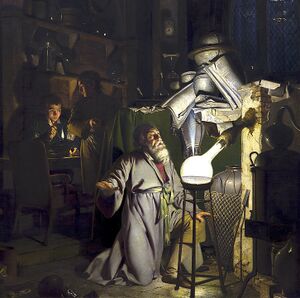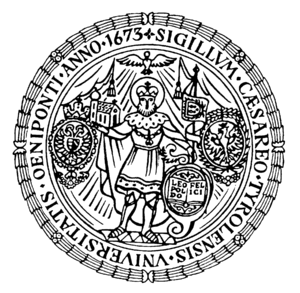Many thanks to our Patrons who cover ~2/3 of our hosting bill. Please join them if you can.
1669
Jump to navigation
Jump to search
1659 < 1660 < 1661 < 1662 < 1663 < 1664 < 1665 <1666 < 1667 < 1668 < 1669 > 1670 > 1671 > 1672 > 1673 > 1674 > 1675 > 1676 > 1677 > 1678 > 1679
 Phosphorus is discovered by German alchemist Hennig Brand, the first chemical element to be discovered that was not known since ancient times. | |
| Year 1669 |
Contents
Events
January–June
- March 11 – Mount Etna erupts, destroying the Sicilian town of Nicolosi.
- May 31 – Samuel Pepys stops writing his diary.[1]
- June 22 – Roux de Marsilly, accused of plotting the assassination of King Louis XIV of France, is publicly tortured in Paris, France.
- June 25 – François de Vendôme, Duke of Beaufort, disappears in battle, during the siege of Candia in Crete.
July–December
- July – The Hanseatic League, after 400 years of operation, holds its last official meeting in Lübeck.
- September 6 – Francesco Morosini, capitano generale of the Venetian forces in the siege of Candia, surrenders to the Ottomans.
- September 23 – Leopold I, Holy Roman Emperor grants the status and privileges of a university to the Jesuit Academy in Zagreb, the precursor to the modern University of Zagreb.
Date unknown
- Shakushain's revolt breaks out in Hokkaido, Japan.
- Mughal emperor Aurangzeb destroys several Hindu temples (e.g. Kashi Vishwanath and Kesava Deo), imposes the jizya tax, leading to Hindu rebellion.
- Ottoman units burn the eastern part of Kolárovo.
- The Chinese Kangxi Emperor allows coastal residents deported in the Great Clearance of 1662 to return home.
- Famine in Bengal kills 3 million people.
- Phosphorus is discovered by German alchemist Hennig Brand, the first chemical element to be discovered that was not known since ancient times.
- Antonio Stradivari makes his first violin in Cremona.
- Okaya & Co. is founded as Sasaya, a trading company in Nagoya, Japan.
- The Chinese herbal medicine company Tong Ren Tang (同仁堂) is established in Beijing.
- Blaise Pascal's Pensées is posthumously published in Paris.
- Jan Swammerdam publishes his Algemeene Verhandeling van de bloedeloose dierkens, a groundbreaking work in microscopy, as well as entomology.
- The Orange College of Breda is wound up.
- Jean Picard begins measurement of 1 degree of Earth's meridian arc in France.
Births
- January 20 – Susanna Wesley, mother of the John and Charles Wesley, known as mother of Methodism (d. 1742)
- April 3 – Jean-Baptiste Forqueray, French musician (d. 1722)
- May 24 – Emerentia von Düben, Swedish royal favorite (d. 1743)
- May 26 – Sébastien Vaillant, French botanist (d. 1722)
- July 30 – Eudoxia Lopukhina, first wife of Peter I of Russia (d. 1731)
- August 27 – Anne Marie d'Orléans, Queen of Sicily and Sardinia (d. 1728)
- August 29 – John Anstis, English herald (d. 1744)
- October 19 – Count Wirich Philipp von Daun, Austrian military leader (d. 1741)
- December 16 – Arnold Boonen, Dutch portrait painter (d. 1729)
- date unknown
- Alessio Erardi, Maltese painter (d. 1727)<
- Jiang Tingxi, Chinese painter (d. 1732)
- Elżbieta Sieniawska, politically influential Polish magnate (d. 1729)
- probable – Peter King, 1st Baron King, Lord Chancellor of England (d. 1734)
Deaths
- January 27 – Gaspar de Crayer, Flemish painter (b. 1584)
- February 3 – Catharina Questiers, Dutch poet (b. 1631)
- February 13 – Peter Venables, English politician (b. 1604)
- February 23 – Lieuwe van Aitzema, Dutch historian and statesman (b. 1600)
- March 10 – John Denham, English poet (b. 1615)
- March 12 – Cornelis Jan Witsen, Mayor of Amsterdam (b. 1605)
- March 17 – Willem van der Zaan, Dutch admiral (b. 1621)
- March 23 – Philipp Buchner, German composer (b. 1614)
- March 25 – Sir Lionel Tollemache, 3rd Baronet, English baronet (b. 1624)
- April 4 – Johann Michael Moscherosch, German statesman, satirist (b. 1601)
- April 5 – Nabeshima Naozumi, Japanese daimyō (b. 1616)
- April 12 – Abdias Treu, German mathematician and academic (b. 1597)
- April 22 – Friedrich Wilhelm II, Duke of Saxe-Altenburg (1639–1669) (b. 1603)
- April 23 – Johannes Canuti Lenaeus, archbishop of Uppsala, Sweden (b. 1573)
- April 27 – Richard Treat, American city founder (b. 1584)
- May 1 – Isaac Thornton, English politician (b. 1615)
- May 14 – Georges de Scudéry, French writer (b. 1601)
- May 16 – Pietro da Cortona, Italian artist (b. 1596)
- June 25 – François de Vendôme, Duke of Beaufort, French soldier (b. 1616)
- July 16 – Thomas Howard, 1st Earl of Berkshire, English politician (b. 1587)
- July 29 – Josias II, Count of Waldeck-Wildungen, major general in Brunswick and co-ruler of Waldeck-Wildungen (b. 1636)
- August 18 – William Gawdy, English politician (b. 1612)
- August 28 – Sir William Drake, 1st Baronet, English politician (b. 1606)
- September 3 – Esteban Manuel de Villegas, Spanish poet (b. 1589)
- September 10 – Henrietta Maria of France, queen of Charles I of England (b. 1609)
- September 28 – Pierre Le Muet, French architect (b. 1591)
- October 4 – Rembrandt Harmenszoon van Rijn, Dutch painter (b. 1606)
- October 9 – Richard Strode, English politician (b. 1584)
- October 14 – Antonio Cesti, Italian composer (b. 1623)
- October 16 – John Trapp, English theologian (b. 1601)
- October 19
- Domenico Fiasella, Italian painter (b. 1589)
- Matthias Sention, Sr., Connecticut settler (b. 1601)
- October 24 – William Prynne, English Puritan leader (b. 1600)
- November 3 – Charles Drelincourt, French Protestant divine (b. 1595)
- November 4 – Johannes Cocceius, Dutch theologian (b. 1603)
- November 7 – Lebrecht, Prince of Anhalt-Köthen, German prince of the House of Ascania (b. 1622)
- November 10 – Elisabeth Pepys, English wife of Samuel Pepys (b. 1640)
- December 9 – Pope Clement IX (b. 1600)
- December 11 – Anna Maria of Mecklenburg-Schwerin, consort of Augustus, Duke of Saxe-Weissenfels (b. 1627)
- December 13 – Thomas Dyke, English politician (b. 1619)
- December 16 – Nathaniel Fiennes, English politician (b. c. 1608)
- December 18 – Johann Philipp of Hanau-Lichtenberg, German nobleman (b. 1626)
- December 25 – George William, Count Palatine of Zweibrücken-Birkenfeld (b. 1591)
- December 31 – Bogusław Radziwiłł, Polish-Lithuanian noble (b. 1620)
New Groups
| Group | Image | Type | Description |
|---|---|---|---|
| University of Innsbruck |  | Public | Third largest university in Austria |
| University of Zagreb |  | The focal institution of higher education in Croatia, educating most of the members of the Croatian intelligentsia. |
Many thanks to our Patrons who cover ~2/3 of our hosting bill. Please join them if you can.